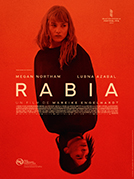Rabia

| Original title: | Rabia |
| Director: | Mareike Engelhardt |
| Release: | Vod |
| Running time: | 95 minutes |
| Release date: | Not communicated |
| Rating: |
Mulder's Review
Rabia, Mareike Engelhardt's first feature film, unfolds like a psychological and oppressive huis clos, where radicalization is played out in the banality of everyday life and the slow submission to an inescapable destiny. Inspired by true events, the film follows Jessica, a 19-year-old French nurse's aide, who, after an insidious process of radicalization, leaves her country to join the Islamic State in Syria. From the outset, Mareike Engelhardt imbues her narrative with a clinical coldness, following in the footsteps of Jessica, now Rabia, with a mise-en-scène that evokes a journey of no return.
The admirably constructed script leaves little room for respite. Far from sensationalist narratives, Mareike Engelhardt prefers the intimate: Jessica's tragedy is played out in the silences, unspoken words and mechanical gestures of everyday life. The changeover takes place without a hitch, in obedience to an invisible authority, symbolized by Madame, played with chilling intensity by Lubna Azabal. A central figure in the film, this ruthless woman imposes draconian rules on the young recruits, transforming each of them into docile wives, ready to serve the Daech fighters.
Mareike Engelhardt sheds light on the mechanics of radicalization from a unique angle: that of mental confinement, a gradual erasure of identity, where Jessica, renamed Rabia, loses all control over her destiny. In this respect, the film finely questions notions of enlistment, submission and revolt. The camera, often placed at face level, scrutinizes the slightest movements of its actresses, capturing with rare precision the doubts, fears and strange exaltation that seize these young women in search of their bearings.
Megan Northam's performance as Jessica is simply overwhelming. She aptly embodies this teenager's quest for meaning, and her gradual transformation into an almost dehumanized being, shaped by the ideology of those she thought she was joining with full knowledge of the facts. Her journey is one of total loss of freedom, where every moment of doubt is quickly extinguished by the omnipresence of Madame, an ambiguous figure who is both protective and tyrannical.
Visually, Rabia plays the sober card, with an almost documentary aesthetic, accentuating the inescapable aspect of the tragedy. The confined spaces, often plunged into a suffocating half-light, become the reflection of a mental prison, and the rare exteriors are always synonymous with danger or humiliation. This omnipresent tension is reinforced by a minimalist soundtrack, giving way to raw sounds, as if to better underline the harsh reality experienced by these young women.
The film, which won the D'Ornano-Valenti Award at the Deauville American Film Festival 2024, stands out for its rigorous yet sensitive treatment of a delicate subject. By focusing on the inner experience of her characters, Mareike Engelhardt offers a powerful reflection on the mechanisms of indoctrination, without ever falling into demonstration or facile moralizing. Rabia is a necessary film, both in terms of its subject matter and the quality of its cinematography, which raises profound questions about our times and the excesses that can befall the most vulnerable souls.
Rabia
Directed by Mareike Engelhardt
Produced by Lionel Massol
Written by Mareike Engelhardt & Samuel Doux
With Megan Northam, Lubna Azabal, Natacha Krief, Léna Lauzemis, Klara Wördemann, Maria Wördemann
Director of photography: Agnès Godard
Editing: Agnès Godard
Production companies: Arte France Cinéma, Kinology International, Films Grand Huit, Starhaus Filmproduktion, Kwassa Films
Distributed by Memento Distribution (France)
Release date:November 27, 2024 (France)
Running time: 95 minutes
Seen September 14, 2024 at Centre International de Deauville (Deauville International Center)
Mulder's Mark:

